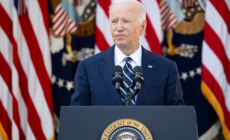-
Contest tightens for LAUSD school board seat in San Fernando Valley; school bond well ahead - 20 mins ago
-
Joey Logano Casts Doubt on NASCAR’s Penalties for Championship Manipulation - 34 mins ago
-
Democracy Is Still Thriving. But for How Long? - 35 mins ago
-
L.A. Community College District Board of Trustees election results - about 1 hour ago
-
Today’s ‘Wordle’ #1,238 Answer, Hints and Clues for Friday, November 8 - about 1 hour ago
-
Violence Tied to Soccer Game Prompts Dozens of Arrests in Amsterdam - about 1 hour ago
-
Prop. 35, which taxes managed care organizations, passed by California voters - 2 hours ago
-
NYT ‘Connections’ November 8: Clues and Answers for Game #516 - 2 hours ago
-
Trump’s Believers See a Presidency With God on Their Side - 2 hours ago
-
Trump-Appointed Judge Kills Biden Immigration Policy Days After Election - 2 hours ago
US Government Shares New Pandemic Plan
U.S. government officials, together with counterparts in Canada and Mexico, have unveiled their latest plans to strengthen regional health security and pandemic preparedness.
The initiative aims to prevent, mitigate, prepare for, respond to, and recover from pandemics and other serious health threats, the U.S. Department of Health and Human Services reports.
The collaboration, called the North American Preparedness for Animal and Human Pandemics Initiative, or NAPAHPI, has been described as a “flexible, scalable, cross-sectoral” platform which aims to strengthen regional capacities for disease control, built on lessons learned from COVID-19 and other healthy security events.
“Diseases know no borders and can spread rapidly in today’s globalized world,” the U.S. Department of Health and Human Services Assistant Secretary for Global Affairs, Loyce Pace, said in a statement.
“The new NAPAHPI recognizes the interconnected nature of people and animal health and the effect it has on the prosperity and security of the United States, Canada, and Mexico. Strengthening health security can only be achieved through continued collaboration.”
The initiative is based on a One Health approach, a collaborative, multisectoral, and transdisciplinary system of healthcare that recognized the interconnected nature of people, animals, plants, and our shared environment, and their respective contributions to human health.
“Cross-sectoral and regionally collaborative approaches like the North American Preparedness for Animal and Human Pandemics Initiative are critical to preparing our three countries for future health challenges and protecting our collective health security,” the U.S. Department of Agriculture’s Secretary of Agriculture, Tom Vilsack, said in a statement.
“Through a One Health approach, [the] USDA [United States Department of Agriculture] will leverage its deep expertise in promoting and protecting the health of plant commodities, safeguarding the health and welfare of food-producing animals, and preventing entry of or controlling plant and animal pathogens, as we join our federal and regional counterparts in this important effort.”
To achieve these goals, the NAPAHPI will establish a Senior Coordinating Body as a key decision-making forum with members from across the health, agriculture, homeland security, and foreign affairs sectors from the three countries. The initiative will focus on the following priority issues:
- Animal diseases with the potential to transmit to humans
- Infectious diseases with the potential to become pandemics
- Threats to regional health security
- Critical infrastructure, medical supply chains, surveillance systems, public health measures and risk communication strategies
- Risk assessments
- Sustainable financing
“The COVID-19 pandemic has shown that there are myriad political, legal, regulatory, policy, preparedness, and response challenges that can be best addressed through a stronger, coordinated regional approach across multiple sectors when facing large-scale events,” the U.S. Department of Health and Human Services said in a statement.
“NAPAHPI provides a renewed opportunity for North American collaboration to prevent and mitigate, prepare for, respond to, and recover from pandemics and other events that pose a threat to regional health security.”

aimintang/quantic69/Getty
Is there a health issue that’s worrying you? Let us know via health@newsweek.com. We can ask experts for advice, and your story could be featured on Newsweek.
Source link




















